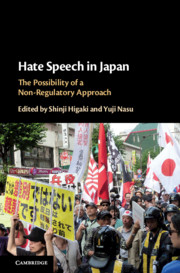Book contents
- Hate Speech in Japan
- Hate Speech in Japan
- Copyright page
- Contents
- Tables
- Figures
- Contributors
- Acknowledgements
- Abbreviations
- Introduction
- Part I Outline
- 1 Hate Speech Regulation and Anti-discrimination in Japan
- 2 Freedom of Expression in Japan
- 3 Hate Speech and International Law
- Part II History
- Part III Legal Framework
- Part IV Cases
- Part V Multidisciplinary Debates
- Part VI Current Issues
- Book part
- Index
3 - Hate Speech and International Law
The Internalization of International Human Rights in Japan
from Part I - Outline
Published online by Cambridge University Press: 15 January 2021
- Hate Speech in Japan
- Hate Speech in Japan
- Copyright page
- Contents
- Tables
- Figures
- Contributors
- Acknowledgements
- Abbreviations
- Introduction
- Part I Outline
- 1 Hate Speech Regulation and Anti-discrimination in Japan
- 2 Freedom of Expression in Japan
- 3 Hate Speech and International Law
- Part II History
- Part III Legal Framework
- Part IV Cases
- Part V Multidisciplinary Debates
- Part VI Current Issues
- Book part
- Index
Summary
The rise of xenophobic campaigns involving hateful speech targeting minorities in Japan has drawn both domestic and international criticism. Responding to the recommendations of UN human rights treaty bodies, the Japanese government enacted its first law against hate speech in 2016. To respond to the question of how a law that provides for no penalties in the event of its breach can be effective, this chapter examines how international human rights norms are internalized in the development of anti-hate legislation, based on a theory of the socialization of international legal norms and transnational legal processes such that they promote national obedience to international human rights law. Analysing the legal and political process, as well as its interaction with civil society as mobilized by the anti-racism social movement, this chapter reveals those international human rights norms that have gradually influenced the judiciary, legislative, and administrative bodies, as well as civil society, smoothing the way for anti-hate legislation. In this regard, this chapter offers a case study of the ’vernacularization’ of international human rights.
Keywords
- Type
- Chapter
- Information
- Hate Speech in JapanThe Possibility of a Non-Regulatory Approach, pp. 58 - 104Publisher: Cambridge University PressPrint publication year: 2021

